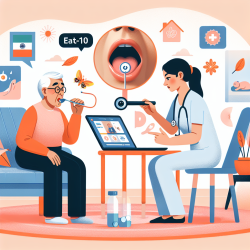Understanding Geriatric Dysphagia: Key Insights for Practitioners
As a speech-language pathologist, you are likely aware of the complexities involved in diagnosing and managing dysphagia, especially among the elderly. The recent study, "Characterization of Geriatric Dysphagia Diagnoses in Age-Based Cohorts," offers valuable insights that can enhance your clinical practice. This blog will delve into the findings of this study and how they can be applied to improve patient outcomes.
The Study at a Glance
Conducted at the Johns Hopkins Voice Center, this retrospective chart review analyzed dysphagia in patients aged 65 and older. The study categorized patients into three age groups: young-old (65-74 years), middle-old (75-84 years), and old-old (85+ years). It examined the etiology and anatomic sources of dysphagia, as well as the impact on swallowing-related quality of life using the Eating Assessment Tool (EAT-10).
Key Findings
- Common Etiologies: The most frequent causes of dysphagia were neurologic and esophageal, with diverticula, reflux, and radiation-induced changes being the most common diagnoses.
- Sex Differences: Men were more likely to present with oropharyngeal disease, while women showed a higher prevalence of esophageal disease.
- Quality of Life: The study found significant quality-of-life impacts associated with diverticular disease, cricopharyngeal hypertonicity, and radiation-induced changes.
Implications for Practice
Understanding these findings can significantly impact your approach to managing dysphagia in older adults. Here are some actionable steps:
- Tailored Assessment: Consider the patient's age and sex when assessing dysphagia. This can guide you in choosing the most appropriate diagnostic tools and interventions.
- Focus on Quality of Life: Use tools like the EAT-10 to assess the impact of dysphagia on a patient's quality of life and tailor your interventions accordingly.
- Interdisciplinary Collaboration: Work closely with other healthcare providers, such as otolaryngologists and gastroenterologists, to ensure comprehensive care.
Encouraging Further Research
The study highlights the need for ongoing research into dysphagia management, particularly in understanding the nuances across different age groups. As practitioners, staying informed about the latest research can help you provide the best care for your patients.
To read the original research paper, please follow this link: Characterization of Geriatric Dysphagia Diagnoses in Age-Based Cohorts.










